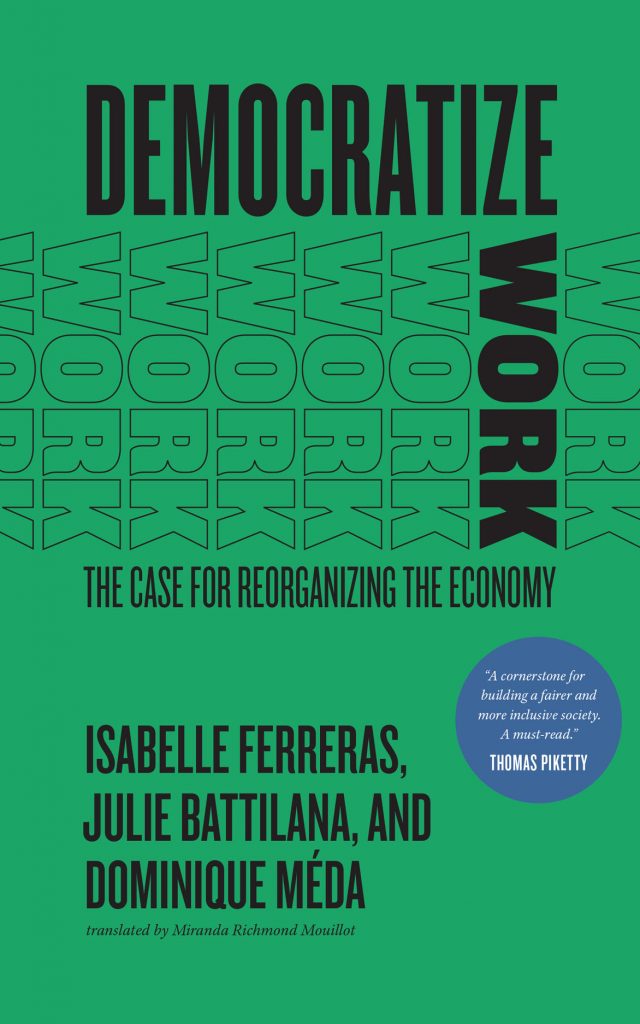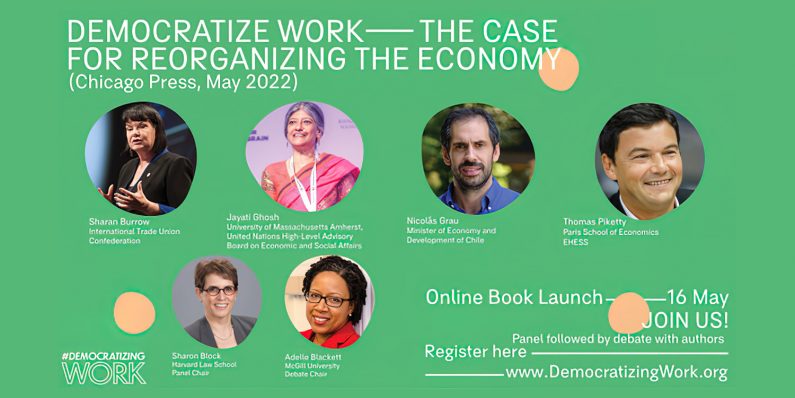À l’occasion du deuxième anniversaire du manifeste
DemocratizingWork.org, ses auteurs, dont deux sont chercheuses membres du Projet de partenariat du CRIMT, présenteront leur nouveau livre intitulé : Democratize Work. The Case for Reorganizing the Economy
Nous entendrons un groupe d’intervenant.e.s exceptionnel.le.s, qui se penchera sur la diversité des perspectives et des acteurs engagés dans le projet #DemocratizingWork et ce projet d’ouvrage. Les échanges se dérouleront en anglais.
- Sharan Burrow, General Secretary of the International Trade Union Confederation and former President of the Australian Council of Trade Unions
- Jayati Ghosh, Professor at the University of Massachusetts Amherst, member of the United Nations High-Level Advisory Board on Economic and Social Affairs, and former Chairperson of the Centre for Economic Studies and Planning at the Jawaharlal Nehru University, India
- Nicolás Grau, Minister of Economy, Development and Reconstruction of Chile
- Thomas Piketty, Professor of Economics at the Paris School of Economics-EHESS, France, and author of Capital in the Twenty-First Century
- Modératrice: Sharon Block, Professor of Practice and Executive Director of the Labor and Worklife Program at Harvard Law School and former Acting Administrator of the Office of Information and Regulatory Affairs (OIRA) for the Biden Administration.
La table ronde sera suivie d’une discussion de 30 minutes entre le public et les 13 autrices du livre. Cette discussion sera présidée par Adelle Blackett de l’Université McGill. Nous espérons vous y retrouver nombreuses et nombreux !

Democratize Work
The Case for Reorganizing the Economy
Isabelle Ferreras, Julie Battilana, and Dominique Méda
Translated by Miranda Richmond Mouillot
An urgent and deeply resonant case for the power of workplace democracy to restore balance between economy and society.
What happens to a society—and a planet—when capitalism outgrows democracy? The tensions between democracy and capitalism are longstanding, and they have been laid bare by the social effects of COVID-19. The narrative of “essential workers” has provided thin cover for the fact that society’s lowest paid and least empowered continue to work risky jobs that keep our capitalism humming. Democracy has been subjugated by the demands of capitalism. For many, work has become unfair.
In Democratize Work, essays from a dozen social scientists—all women—articulate the perils and frustrations of our collective moment, while also framing the current crisis as an opportunity for renewal and transformation. Amid mounting inequalities tied to race, gender, and class—and with huge implications for the ecological fate of the planet—the authors detail how adjustments in how we organize work can lead to sweeping reconciliation. By treating workers as citizens, treating work as something other than an asset, and treating the planet as something to be cared for, a better way is attainable. Building on cross-disciplinary research, Democratize Work is both a rallying cry and an architecture for a sustainable economy that fits the democratic project of our societies.
Contributors include Alyssa Battistoni (Barnard College of Columbia University), Adelle Blackett (McGill University), Julia Cagé (Sciences Po), Neera Chandhoke (University of Delhi), Lisa Herzog (University of Groningen), Imge Kaya Sabanci (IE Business School), Sara Lafuente (European Trade Union Institute), Hélène Landemore (Yale University), Flávia Máximo (Universidade Federal de Ouro Preto, Brazil), and Pavlina R. Tcherneva (Levy Economics Institute of Bard College).



